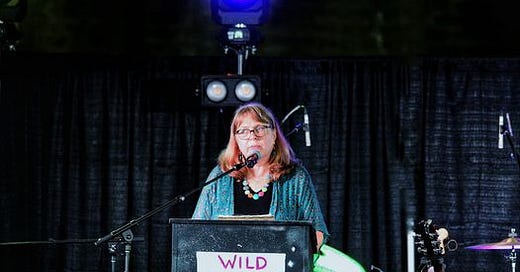

Discover more from The Cottage
This is an open post for the entire community and friends of the Cottage
Today is Ash Wednesday, the beginning of Lent.
Below is a sermon I preached at St. Paul’s Episcopal Church in Alexandria, Virginia, on March 5, 2014 — it is the only time I’ve preached at an Ash Wednesday service.
It is a free-standing sermon and was not originally preached as part of my Lenten series on the cross. Yet, it appropriately sets the direction for the series to come. This sermon suggests a very interesting question regarding the cross: What does it mean to practice the cross?
At first, that seems to be odd theological phrasing. However, it purposefully draws from Wendell Berry’s moving poem, “Manifesto,” echoing its final line: “Practice resurrection.”
When I first read those words, they puzzled me. What does it mean to “practice resurrection”? Over the years, however, the phrase remained in my mind, making far more sense to me now than it once did. It is a call to live an Easter life — to attend to birthing life from death, to pay attention to what is rising around us. Practicing resurrection is a midwifing, nurturing, healing, and boundary-breaking thing to do. And yet, we can do it.
If we can practice resurrection, turning that seemingly impossible Easter event into a way of life, might it be possible to practice the cross? I don’t mean “practicing the cross” like those penitents who flog their backs, i.e., “corporal mortification” (as in Opus Dei) or have themselves physically tortured on crosses (like the folk custom in the Philippines). I don’t even mean the kind of passive-aggressive subservience or submission sometimes associated with the cross. But I do wonder: what did Jesus have in mind when he directed people to “take up your cross and follow me”?
That’s what I’m thinking about this Lent — two interconnected questions of the phrase practice the cross:
What does it mean to practice? And what is the cross?
I confess to not liking either word very much! “Practice” makes me weary and “cross” make me worry. Both are associated with bad, bad theology. And both hold difficult memories in my own life.
And we come once again to Lent, the church season I most dislike. Why? Because it is about these two very things — practice and cross.
Years ago, I gave up Lent for Lent. I didn’t regret it at the time. This year, however, I want to give up giving up Lent. I feel a strange urge to reclaim it. Not on someone’s else theological terms or out of a sense of obligation. But because I’m seeking to understand the story differently. Like the Magi in the Epiphany story, I need to go home by another way.
Join with me as I crossover into this unmapped territory. We can make this crossing together. Let the journey begin.
(Also: there’s an important clarification below about the Jim Wallis conversation tomorrow. Please make sure to read it. Thank you.)
Matthew 6:1-6,16-21
Jesus said, "Beware of practicing your piety before others in order to be seen by them; for then you have no reward from your Father in heaven.
"So whenever you give alms, do not sound a trumpet before you, as the hypocrites do in the synagogues and in the streets, so that they may be praised by others. Truly I tell you, they have received their reward. But when you give alms, do not let your left hand know what your right hand is doing, so that your alms may be done in secret; and your Father who sees in secret will reward you.
"And whenever you pray, do not be like the hypocrites; for they love to stand and pray in the synagogues and at the street corners, so that they may be seen by others. Truly I tell you, they have received their reward. But whenever you pray, go into your room and shut the door and pray to your Father who is in secret; and your Father who sees in secret will reward you.
"And whenever you fast, do not look dismal, like the hypocrites, for they disfigure their faces so as to show others that they are fasting. Truly I tell you, they have received their reward. But when you fast, put oil on your head and wash your face, so that your fasting may be seen not by others but by your Father who is in secret; and your Father who sees in secret will reward you.
"Do not store up for yourselves treasures on earth, where moth and rust consume and where thieves break in and steal; but store up for yourselves treasures in heaven, where neither moth nor rust consumes and where thieves do not break in and steal. For where your treasure is, there your heart will be also."
“Practicing Lent,” a sermon for Ash Wednesday, 2014.
Today is Ash Wednesday. We are six weeks into the new calendar year, which means we are probably about four weeks into breaking our New Year’s resolutions. Less than two months ago, many of us promised ourselves that this year would be different. We would finally lose weight, stop smoking, be nicer to the people next door, volunteer at the homeless shelter, make it to church at least twice a month, and spend more time with the kids.
I know how it is going for me. How’s it going for you?
Change is a funny thing. It is hard. It is often said that church people don’t like change. I have never been convinced that this is really the case. Truth is, we keep coming (however regularly or sporadically) because most of us are aware of how much we need to change and that we can’t quite do it alone.
Yes, there are some people who attend church for comfort, familiarity, tradition, or obligation. In our time, however, churchgoing, even on an important holy day like Ash Wednesday, is no longer required of any of us. This isn’t Puritan New England — no one is going to throw you in jail or fine you. And it isn’t even colonial Virginia — there’s no one here to whom you can sell your crops as you socialize after the service. There’s no one taking roll. No job, no country club you want to join, and no college that you want your children to attend requires that you go to church. Our culture has freed us from obligation.
So why come? We come because we want to, or because we feel some urge, some spiritual compulsion, to do so. And, for many of us, we come because we want to be more deeply connected to God, to be better people, to learn what it takes to follow a life-giving way, to act more justly, to figure out how to love our neighbors as ourselves. We come because we want to — and that being here might help hold us to being better, different.
If you have been to many Ash Wednesdays, or if this is your first, you will hear an invitation. This service bids you to a “holy Lent.” Lent is not just a solemn version of New Year’s, a time for spiritual resolutions instead of secular ones. Lent is a time to practice our faith.
In today’s gospel, Jesus states this negatively, “Beware of practicing your piety before others in order to be seen by them…” To restate this positively, “Practice your faith by attending to your inner life.”
Consider what it means to practice —
Imagine you win a part in a play. You don’t go straight from the audition to the stage. You must practice: read the script, talk with the director, listen to her vision for the production, meet and read with other actors, and memorize lines, cues, and movements. All the while, you also practice at home in front of your own mirror. To get better. To become a new character. To not let down the rest of the crew. To create a beautiful story to be performed in the world. Only many months after you got the part and you do all this, then you go on stage.
That’s what Jesus is pointing to — he isn’t saying that faith is private, that it isn’t to be locked up in a closet or squirreled away in a box in the attic. No, faith is a profoundly, annoyingly courageous, really hard, and very public thing — about living the Kingdom of God, about love and sacrifice and embracing and enacting an alternative way of life over and against the powers of this world.
Indeed, Jesus himself will prove how very public it is to live that faith when we come to the Passion and Easter.
But, in order to enact it in public, we have to practice first.
Giving, praying, fasting — all specifically mentioned in the text — these three things are practices. We do them in order to get better at them; we don’t do them because we are naturally good at them. We go off-stage, to the rehearsal room, to learn the script of Christian living. If you practice, your reward isn’t “heaven” (you aren’t getting an Oscar — sorry), your reward is the reward of getting better at something, gaining confidence as it becomes easier, and not making a fool of ourselves when the time comes to be on stage.
But the main reward is that we are changed by practice. Jesus had some hard words for people who don’t practice what they preach. He called them hypocrites. The bridge between a hypocrite and a faithful follower is practice.
Years ago, I was talking about practice at a church event. An organist interrupted my presentation:
“I get it! When I was little my mother made me practice the piano; then, it started to get interesting, and I practiced without her telling me, I wanted to learn more, I looked forward to lessons and asked for more challenging pieces, then I began to write my own music. I went from piano being my mother’s idea to being a student and I learned how to play the piano. Then, I became a musician.”
And that’s what practice is: the pathway from being someone else’s idea of what is good for us to developing a skill that we enjoy. We become good at something. But, it doesn’t stop there. If you continue to practice, you become different. Practice isn’t just something we do; practice is something that changes who we are.
Lent is a bridge, a season of practice.
Give, pray, fast. Sing, forgive, do justice. Love your enemies, turn the other cheek, keep Sabbath. Offer hospitality, serve the poor, care for the planet. The more we practice our faith, the more we become the person God created us to be – generous, wise, grounded in what is good and beautiful and just. A meaningful life for the sake of the world. Faith deepens. We understand more. We become givers, prayers, those content with simplicity, makers of music, merciful, agents of justice, able to embrace of all people, rested, hospitable, servants, and, stewards of this good earth, our beautiful home.
By practicing our faith, we actually become all the things we promise to be in our baptism vows, we become citizens of the Kingdom of God, the radical followers who embody the beloved community that Jesus proclaimed.
That is the “treasure in heaven.” These are the things that last. Ash Wednesday reminds us that we will die. How will we be remembered? We will be remembered not for what we had, not even for what we did, but for who we were — for our character and our hearts.
This Lent, do not make resolutions; do not promise God anything. Instead, practice being Christian. Practice the Kingdom of God in your life. Do it in your inner world, read God’s script in private, watch yourself in your spiritual mirror, have a chat with your coach, get to know the director, hang out with others who are doing the same and practice together.
Know this will not be easy. You will make many mistakes. You will blow your lines. You will miss a cue. You might even embarrass yourself. But also know that the stage of God’s kingdom beckons — and that every person acts out in public what has been practiced in private. Be ready to take up your part.
We practice. We play. We practice more.
Let us pray:
God, help us to practice faith
in our inner lives that we might
become generous in service,
giving without counting cost,
deeply connected to your Spirit and your desires:
Overflowing with grace
centered in the One
who gave everything
that we might reveal
the power of love
in a wounded world
and share the beauties of God’s living Word.
Make us faithful people, ready to take our part on stage in the great drama of the Kingdom. Amen.
LENTEN REFLECTION SERIES: Crossings
Lent begins THIS WEEK: Ash Wednesday, February 14.
The culmination of Lent is Good Friday, with Jesus’ death on a cross. The cross is the central symbol of Christian faith, a universal sign of life in Christ. Christians wear crosses, sing about the cross, reflect on the cross, and have ritual practices at the cross.
Yet many also struggle with the cross, especially with its complicity in religious violence and a theology that seems to exalt in suffering and pain. Honestly, I’ve struggled with it over the years, often wondering if I could ever voice my reservations.
A few years ago, a church asked me to preach every day for an entire week in their Lenten series based on the theme: “It’s not about us. It’s about the Cross.”
And so, I embarked on a five-sermon exploration of the cross. They have never been published. This Lent, I’m publishing them here. At the Cottage. The sermons have been reworked, updated, and turned into longer written meditations.
During Lent, I’ll share my cross sermons in written form each Wednesday in a series called “Crossings.” Each sermon presents a different image of the cross — the five pieces create a kind of spiritual prism to see the cross from a variety of theological angles.
I think you’ll have your vision widened.
This year, Lent won’t be a daily series (like Advent was). Rather the schedule will be simplified, giving us time to read, pray, and sink into the material. The tentative schedule is:
Monday - a poem and visual to start the week
Wednesday - the sermon/meditation
Friday - five friends will present video meditations on the image from the sermon
The FIVE guests include: Winnie Varghese (St. Luke’s Episcopal, Atlanta), Reggie Williams (McCormick Theological Seminary), Mihee Kim-Kort (First Presbyterian, Annapolis), John Philip Newell (author and global teacher), and Wes Granberg-Michaelson (ecumenical leader, former head of the RCA, and author).
There will be additional opportunities for conversation — and other special guests — as well.
At the end of the series, the five meditations (and some supplemental material) will be compiled into a booklet — Crossings — for you to download and re-read.
THE FULL LENT SERIES IS FOR PAID SUBSCRIBERS. That isn’t meant to be exclusive, but provides a more intimate community for discussion and sharing. Please sign up to join in if you aren’t already a paid subscriber. There are monthly and yearly plans available.
Or, give a gift of The Cottage to a friend.
If you’d like to participate but can’t afford a subscription, just write to us at this email. No one is ever turned away for lack of funds.
**AN IMPORTANT CLARIFICATION**
In Tuesday’s Cottage Reader, we announced that Jim Wallis was coming to the Cottage Zoom on Thursday, February 15. Although we indicated that Cottage Zooms are for PAID SUBSCRIBERS, that may not have been entirely clear to some readers.
All Cottage conversations via Zoom are part of paid subscriptions only — and paid subscribers ALWAYS receive recordings after the live event.
**THE JIM WALLIS CONVERSATION WILL BE THURSDAY FEBRUARY 15 at 4PM EASTERN/1 PM PACIFIC for all paid subscribers. Paid subscribers will receive a link on Thursday morning and recordings will be sent out to the paid list several hours following the live event.**
We apologize for any confusion.
INSPIRATION
It is my Lent to break my Lent,
To eat when I would fast,
To know when slender strength is spent,
Take shelter from the blast
When I would run with wind and rain,
To sleep when I would watch.
It is my Lent to smile at pain
But not ignore its touch.
It is my Lent to listen well
When I would be alone,
To talk when I would rather dwell
In silence, turn from none
Who call on me, to try to see
That what is truly meant
Is not my choice. If Christ’s I’d be
It’s thus I’ll keep my Lent.
— Madeleine L’Engle, “Lent: 1966”
Because I do not hope to turn again
Because I do not hope
Because I do not hope to turn
Desiring this man's gift and that man's scope
I no longer strive to strive towards such things
(Why should the agèd eagle stretch its wings?)
Why should I mourn
The vanished power of the usual reign?
— T.S. Eliot, from “Ash Wednesday”
After reading Ash Wednesday
she looked once at the baked beans
and fled. Luncheonless, poor girl,
she observed a kind of poetic Lent —
and I had thought I liked poetry
better than she did.
I do. But to me its most endearing
quality is its unsuitableness;
and, conversely, the chief wonder in heaven
(whither I also am sometimes transported)
is the kind of baggage I bring with me.
Surely there is no more exquisite jointure
in the anatomy of life than that at which
poetry dovetails with the inevitable meal
and Mrs. B. sits murmuring of avocados.
— Mary Barnard, “Remarks on Poetry and the Physical World”
If you were planning to come to Duke Chapel to hear me preach on Sunday, February 18, please be aware that the date has changed. I was diagnosed two days ago with COVID. (Yes, this is THIRD time! And yes, I am fully vaccinated. And I wear masks on airplanes.) We are rescheduling for the fall. A new date will be posted soon.
I appreciate your prayers. Thank you.











As one of my seniors in the Japanese martial discipline aikido once said many years ago, "Practice doesn't make perfect. Practice makes permanent. Be careful what you practice." Over the years I've grown to appreciate the deep wisdom in Kevin's words.
I'm so sorry you're sick again! My heart is grateful for your words today. Such a beautiful sermon, I would have loved to have heard that live. The poetry for the day is exquisite. I'll keep you in my thoughts and prayers.